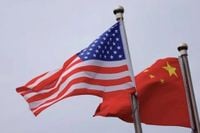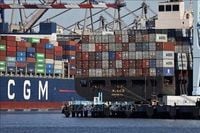In a significant move to address ongoing trade tensions, Chinese Deputy Prime Minister Hà Lập Phong is set to meet with U.S. Treasury Secretary Scott Bessent in Switzerland from May 9 to May 12, 2025. This meeting marks the first high-level interaction between the two nations since the inauguration of President Trump and comes at a critical time when trade relations are strained due to escalating tariffs.
According to Báo Gia Lai điện tử, the discussions will focus on the serious negative impacts that unilateral tariff measures imposed by the U.S. have had on both itself and the global economy. A spokesperson from the Chinese Ministry of Commerce stated that if the U.S. wishes to resolve issues through negotiation, it must first acknowledge these consequences.
Following President Trump’s return to the White House, new import taxes on Chinese goods were enacted, with some items facing tariffs as high as 145%. In retaliation, China imposed tariffs on U.S. imports at rates up to 125%. This tit-for-tat escalation has created significant uncertainty in global markets, prompting calls for a diplomatic resolution.
During an interview with Fox News, Secretary Bessent emphasized the need to reduce tensions before pursuing any comprehensive trade agreements. "We have to de-escalate first, then we can move forward," he remarked, highlighting the cautious approach the U.S. plans to take during these negotiations.
These upcoming meetings are crucial as they aim to lay the groundwork for future negotiations amidst a backdrop of heightened economic rivalry. The U.S. and China are the world’s two largest economies, and their trade relationship significantly influences global economic stability.
China’s decision to engage in talks follows a careful assessment of U.S. information, taking into account global expectations, its own national interests, and the concerns voiced by American businesses and consumers. This willingness to negotiate signals a potential thaw in relations, although it comes with the caveat that if the U.S. continues its aggressive tariff policies, China is prepared to respond firmly.
Experts predict that while these initial discussions may not yield immediate results, they are an essential step in the right direction. Deborah Elms, head of trade policy at the Hinrich Foundation, noted, "You have to start somewhere, so I’m not saying it’s not worthwhile. Just that it may not meet everyone’s expectations right off the bat."
Henry Gao, a law professor at Singapore Management University, echoed this sentiment, forecasting that the negotiations could extend for several months or even longer than a year. The complexity and depth of the issues at stake suggest that a quick resolution is unlikely.
As the world watches closely, the upcoming meetings in Switzerland will serve as a litmus test for the future of U.S.-China relations. Both sides have much to gain from successful negotiations, but the path forward is fraught with challenges.
In summary, the meetings scheduled for May 9-12 in Switzerland represent a pivotal moment in U.S.-China trade relations. With both nations acknowledging the need for dialogue, there is cautious optimism that these discussions could lead to a more stable economic relationship and mitigate the impact of their ongoing trade war.





